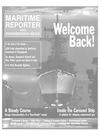
Page 55: of Maritime Reporter Magazine (October 2001)
Read this page in Pdf, Flash or Html5 edition of October 2001 Maritime Reporter Magazine
Special Advertising Section
PRI Fuel Treatment Helps Meet Emissions Challeng es
Power Research he.
Power Research Inc. (PRI) is a manufacturer of industrial grade fuel treatments designed to treat heavy fuel oil, diesel and gasoline. Found- ed in 1985, PRI chemistries incorporate pro- prietary thermal stability technologies that per- mit cleaner combustion, reduced emissions, and prevention of deposits on engine compo- nents and boiler tubes.
PRI offers PRI-R, a heavy fuel oil treatment that overcomes operability issues associated with carbon, vanadium, sulfur and sludge.
First, PRI-R is a maintenance product. PRI-R has been proven to prevent carbon and vana- date deposits results in extended time between component overhauls, hence providing added value and reliability to our vessel owners, increasing bottom line profitability. PRI-R has also been tested independently and found to reduce smoke opacity, NOx and S02.
A 1992 evaluation of PRt-R on an RTA
Sulzer (380 cST fuel oil) provided NOx reduc- tions exceeding 21 percent, with S02 reduc- tions topping 10 percent. Fleet managers who have incorporated the product have reported advantages ranging from double exhaust valve service time between overhauls on medium and slow speed engines, to turbo blades that remain deposit free and waste-heat boilers that are free from soot build-up.
Power Research Inc. also offers PRI-SOLV, a highly concentrated sludge control treatment that has been found to reduce heavy fuel oil sludge by more than 50 percent.
PRI-R and PRI-SOLV are used in a wide variety of propulsion applications, including steam turbines, low- and medium-speed diesels, aboard tanker and bulker fleets, con- tainer and RoRo vessels and cruise ships.
Another product, PR1-D, is an industrial- grade diesel MDO and MGO treatment.
Proven to reduce smoke opacity emissions from diesel engines as much as 50 percent,
PRI-D enjoys widespread application in both commercial and recreational marine. PRI-D is marketed as a fuel stability chemistry, to pre- serve fuel freshness, while capable of restoring the most severely degraded fuels to refinery freshness. PRI-D also dissolves slime and sludge resulting from algae growth, and pre- vents hard carbon deposition on all engine types, hence extending engine component overhaul times. PRI-D has endorsements by engine manufacturers, has been extensively tested for safety and effectiveness under
Nuclear Regulatory Commission (NRC) guidelines for use in standby diesel powered generators at nuclear power facilities.
PRI-D is the choice of many wholesale fuel distributors for bulk fuel treatment in upgrad- ing diesel fuel to the premium category. Power
Research Inc.'s commercial marine clients include tug and ferry fleets, commercial and sport fishing vessels, excursion passenger ves- sels, work boats, harbor barges, oceanographic vessels, among many others.
PR1-G is a gasoline fuel treatment — again designed to permit the cleaner combustion of all gasoline types.
As fuel prices rise, the company has seen more operators change from 180 cST bunkers to 380 cST bunkers, hence affecting operating reliability of medium speed diesels in certain areas. Additionally, there is heightened interest in emissions control mechanisms, with marine diesel engine manufacturers exploring new design options.
There will be limits as to the degree these design changes can positively affect emissions reductions, and we believe that fuel quality enhancement through proper treatment will play an increasing role in these emissions con- trol efforts.
A Burgeoning Market
Owner interest in fuel treatment has grown in recent years. This reflects trends in certain ports toward degraded fuel quality, and increased interest in propulsion system reliabil- ity, particularly in overcoming charter hire loss.
Power Research Inc. expects continued brisk growth over the next several years, owing to continued trends in fuel quality degradation in certain areas, and heightened owner interest in exploring new ways to improve operating reli- ability while cutting maintenance costs.
Emissions reductions will play a much larger role, and our extensive work in this area and documentation through independent evalua- tions provides excellent positioning for PRI-R as the emissions control solution. Key to our expansion is our proprietary technology — already proven to reduce smoke opacity, NOx and S02.
Power Research Inc. has positioned itself to prosper by working closely with shipboard and onshore personnel. As a manufacturing and research organization, Power Research Inc. has extreme flexibility in formulating and tailoring the product line to meet specific needs.
Circle 53 on Reader Service Card www. maritimereporterinfo. com
ATTENTION:
CUT COSTS-IMPROVE OPERATIONS
PRI-R
HFO Treatment
This Vasa 32 exhaust valve is carbon free after 12,000 hours on PRI-R! ' Improve Your Fuel • Reduce Charter Hire Loss • Extend Engine Component Life & Reliability • Enhance Vessel Safety & Emissions Control
PRI-R HFO Treatment and PRI-D MDO Treatment keep vessel operators well within annual budgets by drastically reducing downtime and operational problems that equate to lost revenue. PRI
Products solve fuel-related engine fouling problems - even reduce
NOx and SO2 and smoke emissions.
Here is what PRI has done recently, as documented by our clients: •82 exhaust-valve replacements eliminated each year. Saved more than $73,000 in parts and labor alone! •Boiler washes once done 4 times a year are now only necessary once every 21/2years. $48,000 saved annually! cdowntime at sea eliminated. Charter hire losses which saved $120,000 in annual revenue! •8 days of c avoided, w •Fuel sludge reduced 50%. Savings in fuel value and disposal cost amounted to more than $74,000!
If you are interested in what PRI can do for you, call us today! 1-888-776-9373 Power Research Inc. 3750 Hacienda Blvd., Ste. A Ft. Lauderdale, FL 33314 www.priproducts.com
Circle 280 on Reader Service Card or visit www.maritimereporterinfo.com
October, 2001 44E

 54
54

 56
56
